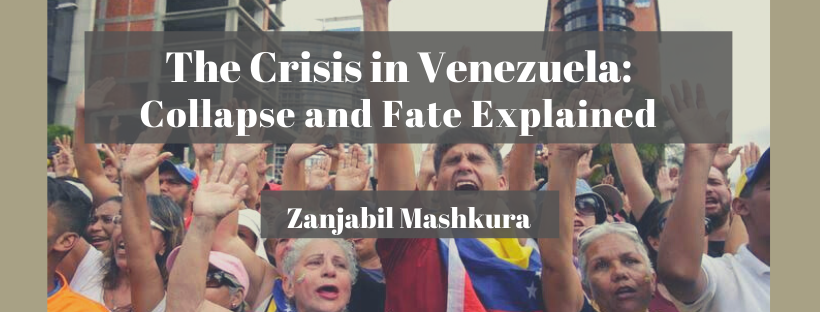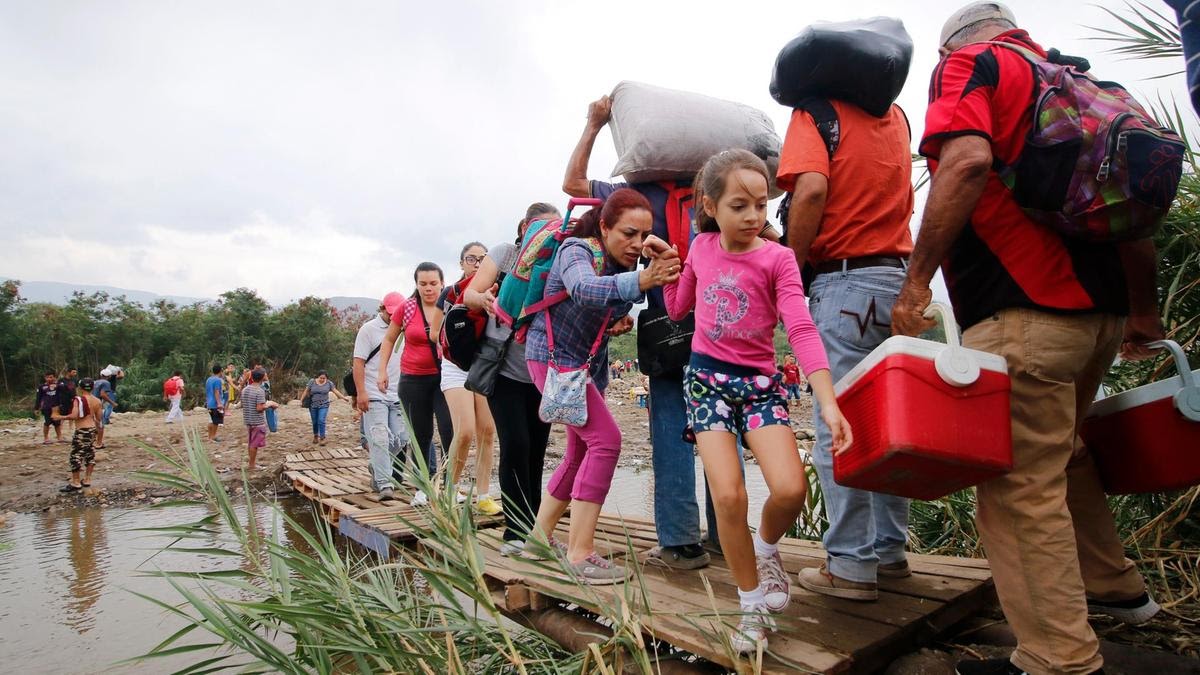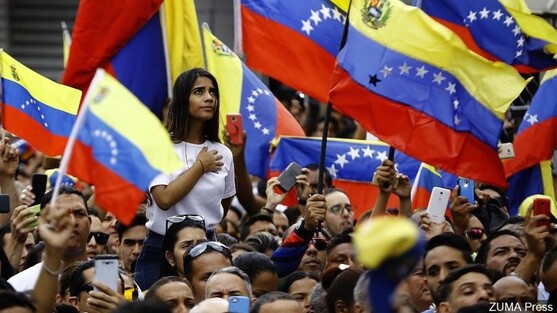ECONOMICS STUDY CENTER, UNIVERSITY OF DHAKA
|
Zanjabil Mashkura Venezuela used to be one of the richest and most powerful countries of Latin America. The South American powerhouse with its promising economy turned upside down at the end of the last decade due to a major economic collapse and political crisis. Everyday thousands of people are leaving their homeland, some stuck in the hospitals while the potential youths are turning into street beggars. Mothers are giving away their children and people are searching for food in dustbins instead of local markets. The local currency Bolivar is crumbling down due to hyperinflation, and with an unstable government and constant corruption, the once healthy nation is now falling apart day by day. According to some economists, the root of the current economic distortion in Venezuela is the result of government mismanagement and the new US sanctions imposed by President Donald Trump. So how did Venezuela go from being a wealthy Latin American nation to a state of complete disaster? Oil Industry A petrostate refers to a small oil-rich country in which institutions are weak, and wealth and power belongs to selective few. Venezuela is a perfect example of a petrostate. Oil was discovered in this land in the early 20th century. Since then, oil has played a dominant role in the Venezuelan economy and diversification of other economic activities barely existed. According to OPEC, oil revenues accounted for 98% of total exports of the country. Venezuela is said to have 300 billion barrels of oil which is roughly 20% of the world’s proven reserve. When President Hugo Chavez first came into power, oil cost 7-9 dollars per barrel. By 2004-05 the price of oil increased to over 100 dollars per barrel. The country’s petroleum dependent economy was booming and President Chavez went on to spend billions of profit on social welfare programs to eradicate poverty from his nation. He was also able to help other Latin American countries from the revenues which brought him international recognition and popularity. But the political system faced devastation when Chavez died in 2013. Under the newly elected President Nicolas Maduro, the price of oil collapsed from 100 dollar per barrel to 30 dollar per barrel in 2016. In 2019 the production of oil dropped by 75% compared to the production rate in 2008 which was 250,000 million barrels per day. Now it is able to produce 600000 million barrels per day. But the fundamental mistake was made a decade ago when Venezuela chose to focus on the oil sector only even though it had tremendous wealth, human capital, vast land, and a strong tourism industry. So when oil prices dropped, Venezuela had no other export industry to rely on. Gradually, the oil crisis led the country towards hyperinflation. Over the last 4 years, Venezuela’s GDP has fallen by 35% - a rate higher than that in the United States during the Great Depression period. This situation of accelerating high inflation completely devastated the economic model for Venezuela. In April 2019, Venezuela held the record for the highest inflation rate in the whole world. But the inflation rate fell to 39113.80% in September 2019 from 58561.1% in August, 2019. Currency Devaluation In 2018, President Nicolas Maduro devalued the Venezuelan currency by 96% and raised the minimum wage by 3500% in an attempt to tackle the hyperinflation crisis. The current minimum wage is 150000 bolivars. But the cost of a basic consumer’s basket is well above that. People cannot buy food because the cost continues to rise by 50% every month. A cup of coffee that cost 450 bolivars in 2016, now costs 7 million Bolivar which is equivalent to fifty cents. To handle the inflation, Madura simply cut five zeros of the currency in 2018. So those 7 million bolivars are 70 bolivars today, still representing 155,000% increase in the cost over the previous year. Shortage of food The government’s tendency to reduce imports in order to balance the economy results in shortage of food in local markets. Food has become a source of conflict amongst poor people. Many Venezuelans are found in the streets looking for food from dustbins. The number of street children rose to 60% in 2018. In a report of BBC, six months pregnant Maria said that she is ready to give up her children in adoption because she cannot afford to raise it. This is the story of hundreds and thousands of women in the country. The report also found situations where parents are mistreating and punishing their hungry children for eating foods reserved for later or for another family member. Healthcare crisis Another setback of hyperinflation seen in the country is the collapsing healthcare system. The public hospitals are overcrowded and unhygienic. However, most medical professionals are nervous about speaking to the press in fear of government oppression. One doctor came up to speak to the BBC reporter describing the horrific conditions of their hospital. The hospital cannot provide anything more than a bed, and doctors are unable to provide patients with medical treatment. These hospitals remain without water for consecutive days. Sometimes water flows for half a day and then goes off again. There’s also massive shortage of electricity. The doctor hopelessly said to the reporter, ‘sometimes all we can do is to help the patient die and not live.’ Government’s own data from 2016 showed maternity mortality rate shot up by 65% compared to 2015. Infant mortality rose by 30% to more than 11000 babies under the age of one, dying in a single year. Migration to Colombia Tens and thousands of Venezuelans fled this wrecked economy to seek shelter in the neighboring South American countries like Colombia. The protest against president Maduro led by the young and unemployed labor force in 2017 shifted into mass migration in no time. The migrants are sending remittances for their families back in Venezuela. This accelerating migration is therefore stabilizing the economy inside the country instead of making it more complicated. It is estimated that hyperinflation ended around ten million percent in 2019. But this massive migration is rather destabilizing the neighboring country Colombia. Also known as the Bolivarian diaspora, this is undoubtedly the biggest refugee crisis ever seen in America. Sex trade Venezuelan migrants in Colombia tend to make a living for themselves through prostitution. Some of these women had careers back home while many others were full time mothers. These women send most of their incomes to their families in Venezuela. One of them had shared her story in an interview where she explained her tough condition. ‘We never thought about being prostitutes. I believe that I, like many other women, came to it because of the crisis in our country.’ US sanction on Venezuela and oil crisis: In January 2019 the United States blocked imports from Venezuelan state oil company PdVSA and several others. Refineries in the USA are the biggest buyers of Venezuela’s crude supply. The treasury department of the United States currently holds financial sanction on 112 Venezuelan individuals. With prohibitions against US purchase of Venezuelan bonds, the total stock of foreign debt of the country has reached 156 billion dollar. The US denies the presidency of Nicolas Maduro and rather recognizes opposite party leader Juan Guaido as the true president of Venezuela. The sanction from the US makes it hard for Venezuelans to handle this huge debt. And with Maduro’s face turned from any sort of international help, the country sees no ray of hope. Venezuela's oil exports fell to their lowest level in August 2019. The nation produced 712,000 barrels per day (bpd) in August, which was 755,000 bpd in July. This incident occurred after president Donald Trump froze all Venezuelan government assets in the United States and warned foreign companies that they too could face sanctions for engaging into any kind of business activities with PDVSA. The Chinese state run company CNPC therefore canceled its plan on importing Venezuela’s crude oil last year in the month of August. Political crisis The economic condition has sparked protests against the ruling United Socialist Party of Venezuela. President Maduro violated basic laws of democracy to maintain his position in power. 73 Venezuelans were killed everyday during 2017 that is 26000 murders in one year. Anti government demonstrators consisting of the working class have come together on the streets to protest against the oppression of Maduro. They insist on continuing the protest as long as the current leader stays in power. On the other hand, the new opposition leader Juan Guaido declared himself as the president of Venezuela which energized the anti government movement through the support of his enthusiastic fans. But experts believe that Maduro will remain in power as long as he has a close alliance with the military. Is there any hope left for Venezuela? Imported commodities are generally rare in Venezuela. Only recently the government decided to loosen up its control over currencies. It has allowed the people and the private banks to buy and sell US dollars for the first time in sixteen years. So the market system is improving. Venezuela’s economy is increasingly dollarized with super market transactions and employers are being paid in US dollars in many cases. The almost worthless currency bolivar is leaving the market and purchasing has become easier through dollar. However a large portion of the country still has no access to foreign currency, especially the least fortunate ones. People with no purchasing power often choose to leave Venezuela and in that way, they too become able to send remittance to their respective families. Moreover, Venezuela has mineral resources, oil resources, and agricultural resources that are quite profitable for large investors. One must also consider its natural beauty. It has some of the best beaches, waterfalls, and mountains in the world which can be promoted to attract tourists. Economists believe if the restriction from the US government gets lifted again, the investment opportunity could emerge largely. However the state run oil company, PDVSA, is still networking to gain new buyers from India, Italy and Cuba. Former senior portfolio manager Jay Newman thinks the condition of Venezuela has become unusually sensitive. The creditors need to consider not just their self interest but they should give a hand to help the country get back on its track. Venezuelan columnist Daniel Lansberg hopes for a better President in place of Nicolas Maduro who probably has a better idea about the country’s economic path. There has to be international pressure on the government and the President must explain his plan to save his country’s economy. IMF, World Bank, International Finance Corporation and other international institutions that help developing countries to move forward can play an active role in Venezuela. If the country’s governance standard can match the international standards in terms of ethics and reduction in corruption, the situation will get much better. Venezuelans are not expecting their government to become overambitious; they just want the economy to become more like how it used to be. The goal is to invest in a way that is productive, creates jobs and brings money to the investors.
1 Comment
Sazzadur Rahman
3/8/2020 08:10:00 pm
Excellent Write up !
Reply
Leave a Reply. |
Send your articles to: |





